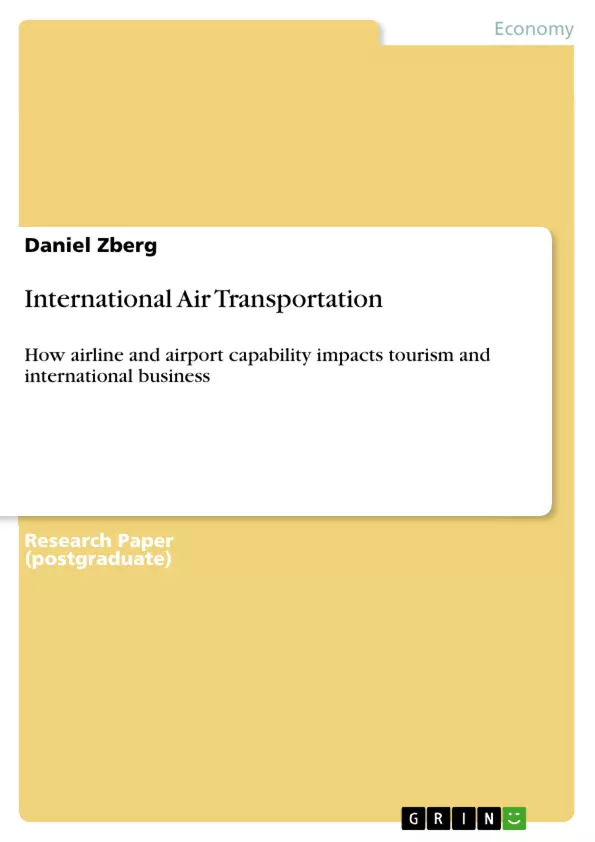Air transportation is a key factor in long-term economic development, growth, and overall success. Like other forms of transportation, air travel simply provides a link between two or more different locations; though, air travel separates itself by offering a very quick alternative to travel vast distances. The unique nature of air transport has proved its significance in developed nations and the increased connectivity has recently demonstrated an even greater impact for developing economies. There are, however, substantial challenges in producing respectable air transport infrastructure in developing nations. In fact, there are also many difficulties involving air travel that affect developed nations as well. Infrastructure, costs, regulation, and sustainability are some of the more noteworthy concerns of international air transportation. Understanding the problem is the first step to creating a solution and, with tangible collaborative efforts, more efficient air transportation networks can begin to benefit the international community.
Inhaltsverzeichnis (Table of Contents)
- International Air Transportation
- The Economic Impact of Air Transportation
- The Role of Air Transportation in Global Trade
- Supporting Remote Operations
- The Growth of Air Transportation
- Deregulation and its Impact
- The Challenges of Air Transportation
- Developing Nations and Their Governments
- The World Bank and Privatization
- Trade Barriers and Foreign Investment
Zielsetzung und Themenschwerpunkte (Objectives and Key Themes)
This research paper explores the complexities of international air transportation, focusing on its significant role in economic development, global trade, and connectivity. It delves into the challenges faced by developing nations in building sustainable air transport infrastructure while examining the impact of deregulation and privatization on the industry.- The Economic Impact of Air Transportation
- The Role of Air Transportation in Developing Nations
- The Impact of Deregulation on the Airline Industry
- The Challenges of Privatization in Developing Nations
- The Importance of Infrastructure and Safety
Zusammenfassung der Kapitel (Chapter Summaries)
This research paper begins by establishing the importance of air transportation as a vital component in economic development and growth. The author highlights its role in connecting distant locations, facilitating international trade, and supporting remote operations.The paper then delves into the significant growth of air transportation, particularly in developing nations. The author explores the impact of deregulation on the airline industry, focusing on both the positive effects of increased competition and the potential risks to safety standards.
Finally, the paper examines the challenges facing developing nations in establishing and maintaining sustainable air transportation infrastructure. The author discusses the role of government, the impact of corruption, and the potential benefits and drawbacks of privatization.
The paper concludes by emphasizing the importance of removing trade barriers and fostering foreign investment in the airline industry to promote safe and sustainable growth.
Schlüsselwörter (Keywords)
This research paper focuses on the complex interplay between international air transportation, economic development, globalization, deregulation, privatization, and sustainable infrastructure. It also explores themes of safety, security, and the impact of government policy on the airline industry.Frequently Asked Questions
How does air transportation impact the global economy?
Air transport facilitates rapid global trade, connects remote operations, and is a key driver for long-term economic growth and international connectivity.
What are the challenges for air transport in developing nations?
Main challenges include inadequate infrastructure, high costs, regulatory hurdles, and sometimes political instability or corruption.
What role does deregulation play in the airline industry?
Deregulation increases competition and can lead to lower prices for consumers, but it also requires strong safety oversight to maintain standards.
Why is privatization a topic in air transportation?
Privatization is often suggested by organizations like the World Bank to improve efficiency and attract foreign investment, though its success depends on the local context.
Why is safety infrastructure critical for international flight?
Consistent global safety standards and modern infrastructure are essential to prevent accidents and ensure the reliability of international air networks.
- Arbeit zitieren
- Daniel Zberg (Autor:in), 2012, International Air Transportation, München, GRIN Verlag, https://www.grin.com/document/267126



